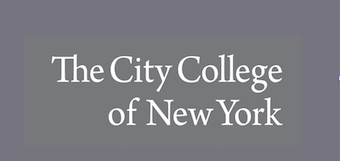
- Subject:
- Arts and Humanities
- Visual Arts
- Material Type:
- Activity/Lab
- Provider:
- CUNY Academic Works
- Provider Set:
- City College
- Author:
- Thayer, Thomas A, Mr
- Date Added:
- 08/01/2018



Syllabus for Fall 2020 Creative Non-Fiction.

Syllabus for Creative Non-Fiction Workshop at City College

This assignment was created for a Creative Writing class called: Writing About New York.

Syllabus for Introduction to Creative Writing at City College

Precise modification of faulty genes for repair has been one of the most important goals in medicine. It is now finally within the realm of possibility thanks to the gene editing tool CRISPR. This microbial adaptive immune system can copy and cut specific DNA sequences. This animation provides a visual introduction of this revolutionary genetic tool.

Precise modification of faulty genes for repair has been one of the most important goals in medicine. It is now finally within the realm of possibility thanks to the gene editing tool CRISPR. This microbial adaptive immune system can copy and cut specific DNA sequences. This animation provides a visual introduction of this revolutionary genetic tool.

This presentation features Cuban art after the Communist Revolution of 1959. It includes the rise of documentary photography and poster design as state-sponsored propaganda art, as well as changes in the visual arts from abstraction to figuration. It includes a brief chronology of Cuban art in the 20th century.

Syllabus for Curriculum and Assessment for Secondary Schools at City College


This course aims to provide an introduction to the main ideologies that structure contemporary political conflict and debate. It is divided in two parts. After an introductory session on the definition of the concept of ideology, the first part is devoted to some of the ‘classical’ political ideologies that emerged over the course of the 18th and 19th centuries and still play a very prominent role in contemporary political conflicts and debates: liberalism, republicanism, socialism, conservatism and anarchism. The second part considers ideological currents that emerged most prominently over the course of the 20th century such as feminism, anti-racism and ecologism. The course ends with a session on the ideology of the ‘end of ideology’ as a way of gauging the question of the continued pertinence of the category of ideology in the 21st century.
Far from aiming to take sides or defend any ideological tradition in particular, the purpose of this course is to deepen the students’ understanding of the complexity and contestability of the issues at stake, in order to provide them with a conceptual ‘map’ to orient themselves amongst the different possible answers that are generally provided to enduring political questions. In keeping with this aim, the course involves a large component of class discussion and debate. About half the classes consist in lectures on exemplary texts from the various ideological traditions to be considered. The other half will consist in structured class debates on issues that emerge from within these traditions. Participation in these debates will be mandatory and graded, inasmuch as they form an integral part of the course.


This course proposes an introduction to some of the central questions in the political theory of democracy. It is based on readings from classical and contemporary authors in the field, but will also require students to engage directly with the material, by participating in a number of structured class debates around each of the questions addressed.
It is divided in three parts. The first focuses on debates that surrounded the theoretical elaboration of three key historical models of democratic government: the controversy over the relative merits of democratic rule in ancient Athens, the pre- and post-revolutionary debates over the notion of ‘popular sovereignty’ in France, and the reflections on the specific nature of the American experiment of popular self-government.
The second part considers some more contemporary debates over the specific nature and value of the democratic form: first by asking whether democracy can be reduced to a mechanism for allowing the peaceful circulation of elites; and second by addressing the question of whether democracy is capable of making ‘rational’ (i.e. ‘good’) political decisions.
Finally, the third part will focus on two more practical issues of implementation: the question of the democratic legitimacy of political representation, and that of its compatibility with constitutionalism.
Far from aiming to take a position on any of the questions we will be discussing, the course aims to deepen the students’ understanding of the contestability of the issues at stake, and therefore to foster debate and controversy both between and within them.

Assignment guidelines for a student assignment on delivering a demonstration speech.

Web Design and Development syllabus:
Art 49540 3AD Design for the Web 2
This course builds on a solid a framework in web design to encompass scripting and interactivity, audio, video and animation over the Web and sophisticated data handling and processing. Emerging technologies and languages (HTML5, Javascript, CSS) will also be addressed.

Syllabus for the "DevOps" course delivered at the City College of New York in Spring 2020 by Jeremy Andrews as part of the Tech-in-Residence Corps program.

Overview lecture for the "DevOps" course delivered at the City College of New York in Spring 2020 by Jeremy Andrews as part of the Tech-in-Residence Corps program.

Without question, families are the cornerstone of educational planning. They are the people who know and love their child the most, and over time they will be the most consistent member of the educational team.


Syllabus for Digital Imaging and Illustration at City College